英语语法作业之倒装句
- 格式:doc
- 大小:67.50 KB
- 文档页数:11

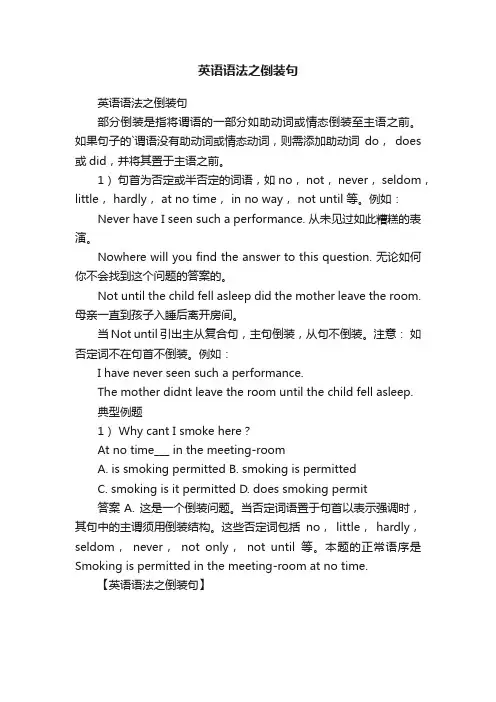
英语语法之倒装句英语语法之倒装句部分倒装是指将谓语的一部分如助动词或情态倒装至主语之前。
如果句子的`谓语没有助动词或情态动词,则需添加助动词do,does 或did,并将其置于主语之前。
1)句首为否定或半否定的词语,如no, not, never, seldom,little, hardly, at no time, in no way, not until 等。
例如:Never have I seen such a performance. 从未见过如此糟糕的表演。
Nowhere will you find the answer to this question. 无论如何你不会找到这个问题的答案的。
Not until the child fell asleep did the mother leave the room. 母亲一直到孩子入睡后离开房间。
当Not until引出主从复合句,主句倒装,从句不倒装。
注意:如否定词不在句首不倒装。
例如:I have never seen such a performance.The mother didnt leave the room until the child fell asleep.典型例题1) Why cant I smoke here?At no time___ in the meeting-roomA. is smoking permittedB. smoking is permittedC. smoking is it permittedD. does smoking permit答案A. 这是一个倒装问题。
当否定词语置于句首以表示强调时,其句中的主谓须用倒装结构。
这些否定词包括no,little,hardly,seldom,never,not only,not until等。
本题的正常语序是Smoking is permitted in the meeting-room at no time.【英语语法之倒装句】。
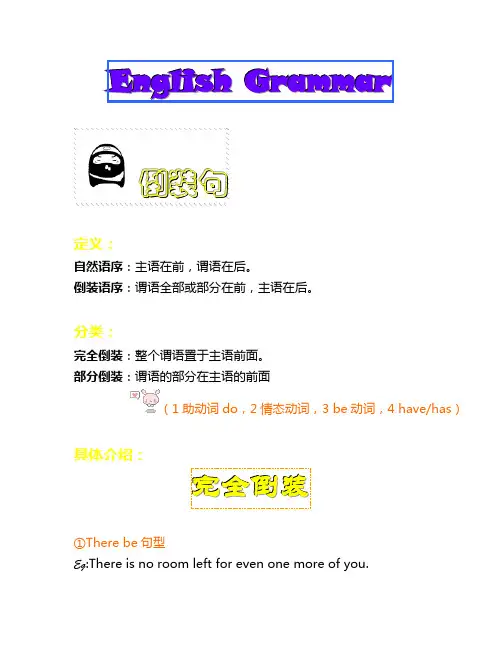
English Grammar 倒装句定义:自然语序:主语在前,谓语在后。
倒装语序:谓语全部或部分在前,主语在后。
分类:完全倒装:整个谓语置于主语前面。
部分倒装:谓语的部分在主语的前面 (1 助动词 do,2 情态动词,3 be 动词,4 have/has)具体介绍:完 全倒装①There be 句型 Eg:There is no room left for even one more of you.②疑问句 Eg: Is breakfast ready yet?③直接引语 Eg:"Can you give me a hand?"said he. ④表祝愿 Eg:May all of you succeed in the coming examination! Eg:May the friendship between the peoples of our countries develop! ⑤表示方向、地点、时间的词位于句首(★): in,out,down,up,off,back,away,over there,there,now,then,here,first Eg:Then followed a shot of gun. Eg:Out rushed the children.★TIPS TIPS(here ,there 倒装,主语是人称代词则是部分倒装) Eg:Here comes your husband. There goes the bell. Eg:Here you are. There he comes.⑥表示方向地点时间的介词短语位于句首(★): Eg:Through the window came in the sweet music. Eg:By his side stood a little boy. ⑦表语长,使句子平衡,尤其是主语带有较长的修饰语时(★) Eg:Ahead sat the old man who told us the stories about the Long March(长征). Eg:Many and long were the conversations they held through the prison way. ⑧用于省略 though/although 的让步状从,提 as(★★★) Eg:Although he was poor ,he was honest. →Poor as he was,he was honest. (adj./n./adv./v.)+as+主+be 动词★TIPS TIPSEg:Although he is a child,he knows a lot about history. →Child as he is,he knows a lot about history. 在这样类型的倒装中,名次前省略冠词,最高级前省略 the Eg:Oldest as he is,he doesn't do well in studies.部 分倒装①否定性质的词或者结构置于句首时(★★) Not,little,hardly,never,no sooner…than…,hardly …when…,not only…but(also),not only…but…as well,at no time,by no means,under no condition,in no case,nowhere,seldom,few,never before,barely(几乎不),scarely Eg:Never shall i forget it. By no means will this method be satisfactory. Hardly had i picked up the phone when he hung up(挂断). Eg:He didn't receive a letter until a week later →Not until a week later did he receive a letter. ②Only 位于句首(★★★) Eg:Only by working hard can we succeed. (介词短语) Eg:Only then did i realized that i was wrong. (adv.副词) Eg:Only when the war was over in 1949 was he able to get back home. (从句)③So(such)…that…置于句首(★)Eg:So angry was he that he couldn't speak . Eg:Such a boy is he that we all love him. ④方式状语,频度状语置于句首(★) often,always,once,many a time,now and then(不时的),every other day(每隔一天) Eg:Often did i spoke of him before. Always does he ask me for money. Eg:Long did we wait before we heard from him. ⑤“也”与上文内容相符的人或事(★★) Eg:——We saw the film last week. ——So did they. Eg:——I have never been aboard. ——Neither/Nor has him.★TIPS TIPS表示对于上文所诉的简单重复肯定时,不倒装! Eg:——Oh,I forget to lock the door ——So you did. ⑥句首省略 If 的虚拟条件句中,句中含有 should,had,were(★★★) Eg:If i were your father,i would give you the money. →Were i your father,i would give you the money.Eg:If it should rain,the crop would grow better. →Should it rain,the crop would grow better. Eg:If he should come tomorrow,i would tell you. →Should he come tomorrow,i would tell you.虚拟语气条件句 与现在相反 If+S+V-ed(be→were) (过去时) S+ 主句 would should could might Eg:If i had time today,i would go with you. 与过去相反 If+S+had done (过去完成时) S+ should Would +have done could might Eg:If i had had time yesterday,i would have gone with you. If i had followed your advice,i wouldn't have maken such a +V(原形)mistake. 与将来相反 V-ed If+S+ should do Were to do S+ Would should Could might +V(原形)Eg:If i were to see him tomorrow,i would very happy.★TIPS: TIPS:1 在虚拟语气中,be 的形式各人称都用 were。
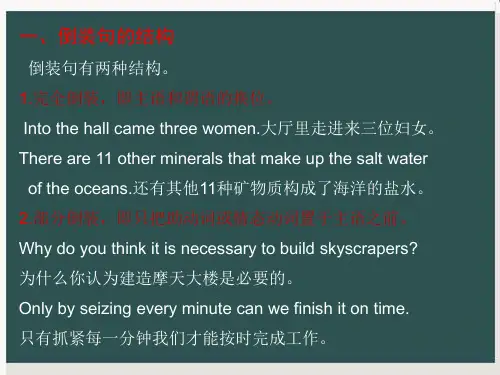
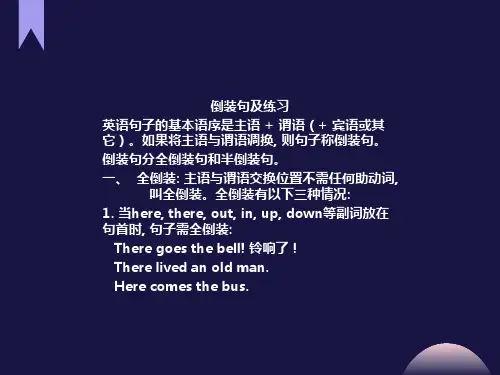
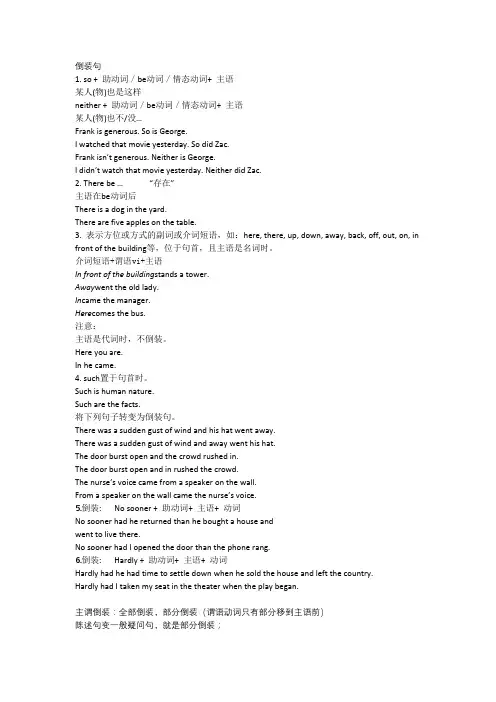
倒装句1. so + 助动词/be动词/情态动词+ 主语某人(物)也是这样neither + 助动词/be动词/情态动词+ 主语某人(物)也不/没…Frank is generous. So is George.I watched that movie yesterday. So did Zac.Frank isn’t generous. Neither is George.I didn’t watch that movie yesterday. Neither did Zac.2. There be … “存在”主语在be动词后There is a dog in the yard.There are five apples on the table.3. 表示方位或方式的副词或介词短语,如:here, there, up, down, away, back, off, out, on, in front of the building等,位于句首,且主语是名词时。
介词短语+谓语vi+主语In front of the building stands a tower.Away went the old lady.In came the manager.Here comes the bus.注意:主语是代词时,不倒装。
Here you are.In he came.4. such置于句首时。
Such is human nature.Such are the facts.将下列句子转变为倒装句。
There was a sudden gust of wind and his hat went away.There was a sudden gust of wind and away went his hat.The door burst open and the crowd rushed in.The door burst open and in rushed the crowd.The nurse’s voice came from a speaker on the wall.From a speaker on the wall came the nurse’s voice.5.倒装: No sooner + 助动词+ 主语+ 动词No sooner had he returned than he bought a house andwent to live there.No sooner had I opened the door than the phone rang.6.倒装: Hardly + 助动词+ 主语+ 动词Hardly had he had time to settle down when he sold the house and left the country.Hardly had I taken my seat in the theater when the play began.主谓倒装:全部倒装,部分倒装(谓语动词只有部分移到主语前)陈述句变一般疑问句,就是部分倒装;Only句首,部分倒装;否定词提前,部分倒装。
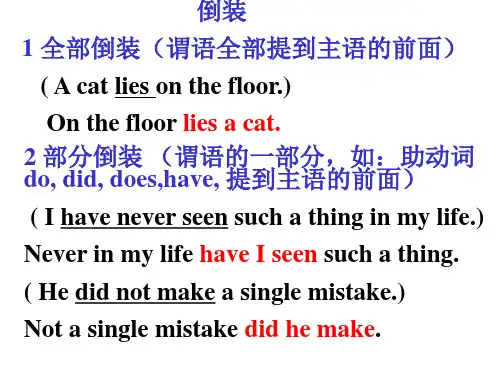
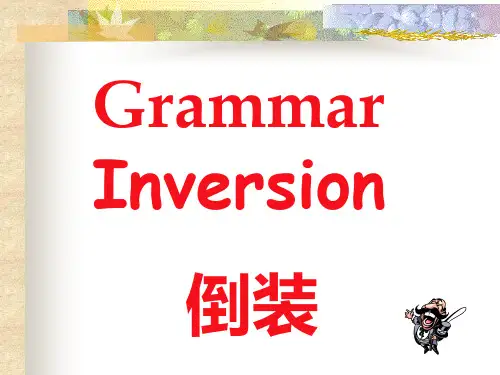
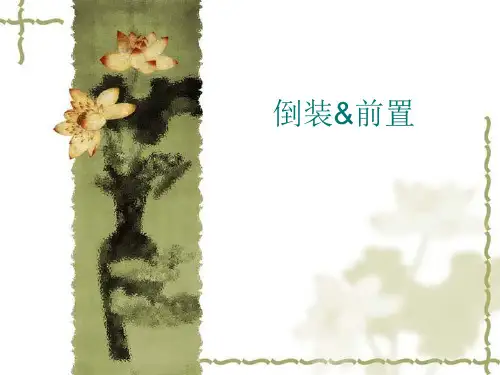
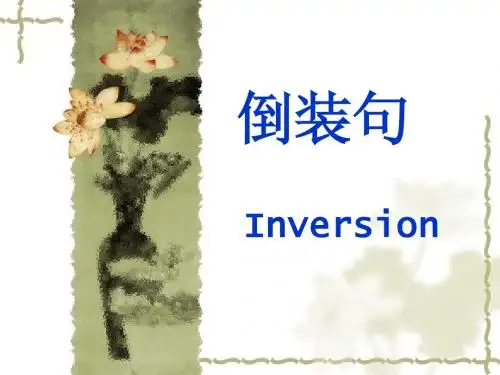
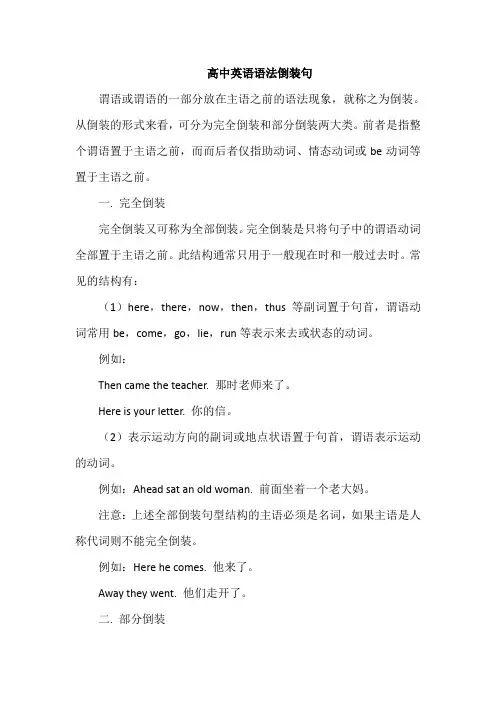
高中英语语法倒装句谓语或谓语的一部分放在主语之前的语法现象,就称之为倒装。
从倒装的形式来看,可分为完全倒装和部分倒装两大类。
前者是指整个谓语置于主语之前,而而后者仅指助动词、情态动词或be动词等置于主语之前。
一. 完全倒装完全倒装又可称为全部倒装。
完全倒装是只将句子中的谓语动词全部置于主语之前。
此结构通常只用于一般现在时和一般过去时。
常见的结构有:(1)here,there,now,then,thus等副词置于句首,谓语动词常用be,come,go,lie,run等表示来去或状态的动词。
例如:Then came the teacher. 那时老师来了。
Here is your letter. 你的信。
(2)表示运动方向的副词或地点状语置于句首,谓语表示运动的动词。
例如:Ahead sat an old woman. 前面坐着一个老大妈。
注意:上述全部倒装句型结构的主语必须是名词,如果主语是人称代词则不能完全倒装。
例如:Here he comes. 他来了。
Away they went. 他们走开了。
二. 部分倒装部分倒装是指将谓语的一部分如助动词或情态倒装放到主语之前。
如果句子的谓语没有助动词或情态动词,则需添加助动词do,does 或did,并将其置于主语之前。
(1)句首为否定或半否定的词语,如no, not, never, seldom, little, hardly, at no time, in no way, not until…等。
例如:Never have I seen such a performance.从未见过如此糟糕的表演。
Nowhere will you find the answer to this question.无论如何你不会找到这个问题的答案的。
Not until the child fell asleep did the mother leave the room.母亲一直到孩子入睡后才离开房间。
倒装英语句子的正常语序(Normal Order)是主语放在谓语动词前。
如果句子的谓语动词位于主语之前,这种语序被称作倒装语序(Inverted Order)。
倒装语序有全部倒装和部分倒装两种。
一般说来,英语中有两种情况需要使用倒装句:一种是由于语法结构的需要而进行的倒装,另一种是由于修辞需要而进行的倒装。
1.全部倒装:1)There be 句型:还有live, happen, exist, remain, stand, sit, lie, seem等作这类句型的谓语There are many students in the classroom. There live / exist a variety of beings around the corals.There happened to be no body in the bedroom when the fire broke out.There lies a large Greenland in front of the house .2)Here / there / now + vi(常为come, go)+主语(必须是名词)(这时句中不能用正在进行时)此句型中here / there (用来唤起注意)喂,注意了Here comes Mary. There goes the bell. Here comes the bus. 但:There he comes.here句中也可用系动词Here is John. Here are some story books I want.Here we are. This is the station. 咱们到了,这就是火车站。
“Give me some paper.”“Here you are.”“给我点纸。
”“给你。
”3) then引起,谓语为come, follow的句子Then came a new difficulty. 然后产生了一个新的困难。
高中英语语法:特殊句式之倒装句一、全部倒装全部倒装就是把句子的谓语动词前置到主语前面构成的倒装句。
★1、表示方向、地点、位置移动或时间的副词,比如in、out、down、off、away、now、then、here、there等置于句首且主语是名词时,句子用全部倒装。
◇Here comes the bus. 公交车来了【但当主语是人称代词时,句子不倒装。
比如Here she comes.她来了】◇Now comes your turn. 现在轮到你了。
◇Up went the fireworks into the air.嗖的一声,焰火上了天。
★2、表示存在的there be句型,主语在be之后。
除了be外,还可使用lie,live,come,exist,sit,stand,remain等不及物动词。
◇ There are so many things to learn today.今天有很多东西要学。
◇There exists an ancient temple in this town,which attracts many visitors.这个镇上有一个古代庙宇,吸引着许多游客。
3、介词短语放在句首作状语,谓语动词是lie, stand , sit ,exist , stretch , come等或系动词be,主语是名词时。
◇At the foot of the mountain lies a clean stream.山脚下有一条清澈的小溪。
4、代词such放在句首,句子的谓语动词是be。
◇Such is what he wanted.这就是他想要的。
5、为了保持句子平衡,使上下文紧密街接,常将表语和状语放在句首,引起主语和谓语的倒装。
◇Gone are the days when we used foreign oil.我们用“洋油”的时代一去不复返了6、现在分词、过去分词、形容词、副词等有时可移到句首,来对动作或状态加以强调。
Compiled by Ma Junqi倒装句英语句子的主语通常位于谓语动词之前,这种语序被称为正常语序。
但有时出于强调或某种特殊的语法结构的需要,需要将谓语动词放在主语之前,这种语序则叫倒装语序。
按倒装的形式,倒装可分为两类,一是完全倒装,二是部分倒装。
完全倒装是指全部谓语放在主语之前,部分倒装是指只把助动词、情态动词或 be 动词放在主语之前,谓语的主体部分仍在主语之后。
一、完全倒装1. 用于there be 句型。
例: There are many students in the classroom.原句自然顺序是:Many students are there in the classroom.★2. 表示地点的here 和 there 位于句首时,其后用完全倒装形式。
这类倒装句的谓语通常是动词be 和 come, go 等表示移动或动态的不及物动词,动词 (表示存在 )。
例: Here comes the bus. 公共汽车来了。
以及stand, lie, live 等表示状态的There goes the last train. 最后一班火车开走了。
There stood a desk against the wall. 靠墙放着一张书桌。
注意:若主语为人称代词,则不倒装。
如:Here you are.这就是你要的东西。
(给你。
)Here it comes.它来了。
★3. 表示方向的副词away, down, in, off, out, over, round, up等位于句首时,其后用完全倒装语序。
这类倒装句的谓语通常表示动态的不及物动词。
Out rushed the puppy. 小狗冲了出去。
Away went the girl.那个女孩走远了。
Down came the rain and up went the umbrellas. 下雨了,伞都撑起来了。
注:若主语为人称代词,则不能用倒装。
英语语法倒装句倒装句是指将原本句子主语和谓语的位置交换,以强调某个部分或改变句子的语气。
常见的倒装句有以下几种形式:1. 完全倒装句:将整个谓语都移到主语之前。
- 原句:She is studying for the test.- 完全倒装句:Is she studying for the test?2. 部分倒装句:只将助动词或情态动词移到主语之前。
- 原句:You can go to the party.- 部分倒装句:Can you go to the party?3. 副词位于句首的倒装句:将副词或短语放在句首,主语和谓语保持原来的位置。
- 原句:I have never been to Paris.- 倒装句:Never have I been to Paris.4. so/neither/nor等连接词引导的倒装句:用于表示前面所说的情况也适用于后面所提到的事物。
- 原句:He doesn't like coffee. I don't like coffee either.- 倒装句:He doesn't like coffee. Neither do I.5. 倒装的条件从句和时间状语从句:- 原句:If it rains tomorrow, we will stay at home.- 倒装句:Should it rain tomorrow, we will stay at home.- 原句:When the train arrives, we will leave.- 倒装句:When arrives the train, we will leave.需要注意的是,倒装句大多用于特殊情况下,平时运用时应当谨慎使用。
英语语法之倒装句完全倒装表示地址的副词here, there 置于句首, 且主语是名词(不是代词) 时表示时间、方向的副词或介词短语置于句首, 且主语是名词(不是代词) 时作表语的形容词、分词、介词短语、such 置于句首时部份倒装“only+状语”置于句首, 主句需要部份倒装具有否定意义或半否定意义的副词和含否定词的介词短语置于句首作状语时“so或neither + 助动词/情态动词/be 动词+主语”表示“……也/也不”so/such...that...句型以had/were/should 开头省略if 的虚拟条件句形式倒装感叹句the more...the more...句型whatever 或however 引导的妥协状语从句as /though 引导的妥协状语从句考点一倒装句一、完全倒装(Full Inversion)谓语部份完全放在主语之前的句子,即是完全倒装句。
1.副词、介词短语类:①表示地址的副词here, there 置于句首, 且主语是名词(不是代词) , 需用完全倒装, 其形式为: There/Here+谓语+主语。
常常利用于此句型的谓语动词为be, go, come, exist, follow, remain, lie等, 时态要用一般此刻时。
There goes the last bus.末班公共汽车开走了。
Here is the address of your hotel.这里就是你宾馆的地址。
There goes the bell for break.下课铃响了。
Here you are.给你。
(代词作主语, 不倒装)②表示时间的副词(如: now, then 等) 、运动方向的副词(如:out, in, up, down, away 等) 及表示地址的介词短语置于句首, 且主语是名词(不是代词) , 需用完全倒装, 其形式为: 副词或介词短语+谓语+主语。
常常利用于此句型的谓语动词为come, fall, follow,exist, lie, go, remain, run 等, 时态为一般此刻时或一般过去时。
2023年初中英语语法之倒装句用法详解及练习分析倒装句在英语中,主语和谓语是句子的核心,它们之间有两种语序:一是主语在谓语之前称为自然语序;二是主语在谓语之后则称为倒装语序。
而倒装语序中又有完全倒装和部分倒装1.完全倒装(Full Inversion):又称"全部倒装",是指将句子中的谓语全部置于主语之前。
此结构通常只用于一般现在时和一般过去时。
①谓语+主语+……There be(的各种形式)+主语(+地点或时间状语)例子:There was a drop in the temperature.温度下降了。
There are birds singing in the tree.鸟儿在树上唱歌。
②副词+谓语动词+名词主语+……例子:Out rushed a young lady.一个年轻的女士冲了出来。
③过去分词或现在分词+be动词的各种形式+主语+……例子:Scattered on the floor were several books and magazines.几本书和杂志散落在地板上。
2.部分倒装(Partial Inversion)(又称半倒装句):指将谓语的一部分如助动词或情态动词倒装至主语之前,而谓语动词无变化。
如果句中的谓语没有助动词或情态动词,则需添加助动词do,does或did,并将其置于主语之前。
例如:Nor did he let the disease stop him from living the kind of life he has always dreamt about.疾病没有使他放弃过上梦想中的生活。
部分倒装也有以下几种常见类型:1.以否定词开头的句子要求部分倒装。
注意下列句子中助动词或情态动词提前、甚至补充助动词的用法:例:Not until yesterday did little John change his mind.小约翰直到昨天才改变了主意。
语法结课作业之倒装句consents一、倒装句之全部倒装1..有些动词和副词out, in, up, down, away构成不及物动词短语,2在表示方向、地点的副词或某些介词词组开头的句子,3 直接引语的部分或全部在句首4 当主语是代词,谓语是系动词,表语是说明性的词、词组和定语从句时5 在某些表示祝愿的句型中二、倒装句之部分倒装1. 具有(半)否定意义的词或短语位于句首,句子用部分倒装1). (半)否定的词语位于句首时2)介词+no位于句首时3). not...位于句首时,4)以否定副词开头并加状语放在句首的句子2.so, neither, nor作部分倒装3. only+状语位于句首时,4. as, though 引导的倒装句5.so / such...that结构中的so或such位于句首6.so / such...that结构中的so或such位于句首7. so / such...that结构中的so或such位于句首8.在if虚拟语气条件句中9.由no matter how, however和how引导的状语从句InversionIn statement it is usual for the verb to follow the subject. Sometimes, however, this word order is reserved. We can refer to this as INVERSION.全部倒装:全部倒装是只将句子中的谓语动词全部置于主语之前。
此结构通常只用与一般现在时和一般过去时。
部分倒装:部分倒装是指将谓语的一部分,如助动词或情态倒装至主语之前。
如果句中的谓语没有助动词或情态动词,则需添加助动词do, does或did,并将其置于主语之前在疑问句中各种疑问句一般地说都是倒装语序,在感叹句中某些感叹句也用倒装语序。
如:Will they come to see us this weekend ? 这个周末他们将来看我们吗?She is not a student, isn't she ? 她不是个学生,对吗?Have you ever seen such a naughty kid like him ! 你见过那个孩子像他这么调皮!为了能够更全面的分析各种倒装句型结构,下面我将主要运用陈述句中倒装结构给大家做一次全面的分析:一、倒装句之全部倒装1).有些动词和副词out, in, up, down, away构成不及物动词短语,为使句子更生动,常将副词提前至句首。
如:Up went the rocket into the air. 嗖地一声火箭就飞上天了。
Just then in came two people.就在那时两个人进来了。
(是Just then two people came in的倒装.)2)a.在表示方向、地点的副词或某些介词词组开头的句子,(介词如there,here,out,in,up,down,away,in front of,now,then,off等,地点如south of the city,to the north of the city)b.以地点副词here, there和时间副词now, then 开头,后面的动词是be, come, exist, fall, follow, go, lie, remain, sit,seem, stand等,而主语又是名词时,构成完全倒装句。
如:Up climbed the boy when his mother came.他妈妈进来的时候男孩爬上去了。
There goes the bell.铃声响了。
Under the tree stands a boy.一个男孩站在树下。
In front of the house was a small garden.在那个房子前面是一个小花园。
From the window came the sound of music.音乐声通过那扇窗户飘了出来。
注意:上述全部倒装的句型结构的主语必须是名词,如果主语是人称代词则不能完全倒装。
Here comes the postman! (注意实意谓语动词位于主语之前。
)邮递员终于来了!Here we are. (注意系动词位于主语代词之后。
)我们到了。
附加:there引出的完全倒装句:除了最常见的there be句型以外,there还可以接appear, exist, lie, remain, seem to be, stand等,一般都译成"有"的含义,构成完全倒装句。
如:There appeared to be a man in black in the distance.远处有个穿黑色衣服的人。
3)直接引语的部分或全部在句首。
如:"Is it ready yet?"asked my father.4)当主语是代词,谓语是系动词,表语是说明性的词、词组和定语从句时,可以使用完全倒装句,起强调作用。
例:Lucky is he who has been enrolled into a famous university.他真幸运,被一所名牌大学录取了。
Typical for China is the crosstalk show where a pair of comediansentertains the audience with word play.中国典型的是相声表演,两个喜剧演员通过文字游戏逗乐观众5)在某些表示祝愿的句型中例句:Long live the PRC! 中华人民共和国万岁!May you all be happy. 祝你们所有人都幸福。
二、倒装句之部分倒装1. 具有(半)否定意义的词或短语位于句首,句子用部分倒装。
1). (半)否定的词语位于句首时,such as:no, not, never, seldom, little, hardly:Never have I seen such a performance.我从来没有看到过这样的表演。
Seldom do I go to work by bus.我很少乘公共汽车上班。
2). 介词+no位于句首时,such as at no time, by no means in no way,f or no reason; in no case;on no account, under /in no circumstances,at no pointIn no country other than Britain, it had been said, can one experience four seasons in the course of a single day.据说除了英国世界上没有哪个国家能让人在一天中感受到四季变化Under no circumstances should you lend Paul any money.什么情况下你都不应该借给paul钱。
注意:in no time 的意思是马上,不含否定意思,因此它置句首句子不倒装。
3). not...位于句首时,such as not only, not until ,not+名词作主语:注意下列句子中助动词或情态动词提前、甚至补充助动词的用法:例:Not until yesterday did little John change his mind.小约翰直到昨天才改变了主意。
Not until the child fell asleep did the mother leave the room.一直到他妈妈离开房间这个小孩才入睡。
Not even one cloud will I bring away。
不带走一片云彩.注意: a)当Not until引出主从复合句,主句倒装,从句不倒装。
如果上述否定副词出现在强调句型中的前半部分,不用倒装:例:It was not until he went abroad that he know the truth of the fact. 他出国之后才知道事情的真相。
b)如否定词不在句首不倒装。
I have never seen such a performance.从来没看过这种表演。
4)以否定副词开头并加状语放在句首的句子要求部分倒装。
这些否定副词有bay,如Not only…but also, barely/hardly/scarcely......when/before; no sooner......than:Hardly had she gone out when a student came to visit her.一个学生来拜访他时,她刚出去。
No sooner had I got home than it began to rain.我刚到家就下起了雨注意:a)只有当Not only… but also连接两个分句时,才在第一个分句用倒装结构。
如果置于句首的Not only… but also仅连接两个并列词语,不可用倒装结构。
Not only you but also I am fond of music.你和我都喜欢音乐。
b)如果hardly, scarcely后面接的是any, ever, at all时,意义类似almost no/ not/ never(几乎不、从不),则无须倒装。
例:Hardly any people having been invited went there.几乎没有什么受到邀请的人去那里了。
2.so, neither, nor作部分倒装1)表示前面的情况也适合另一人或同一人的另一情况,neither和nor 表示对前一句否定句的赞同或行为一致。
例:You don't know what to do now, neither/ nor do I .你不知道现在该做什么,我也不知道。
He used to have his further study abroad; so did I.他曾去国外深造过,我也去过。
They are not now preparing for their final examinations; nor are we .他们没在为期末考试作准备,我们也没有。
注意:当so引出的句子用以对上文内容加以证实或肯定时,不可用倒装结构。
意为"的确如此"。
neither和nor共有种倒装形式,其含义分别为:a)用法正好相反,表示对前一句否定句的赞同例:You don't know what to do now, neither/ nor do I .你不知道现在该做什么,我也不知道。